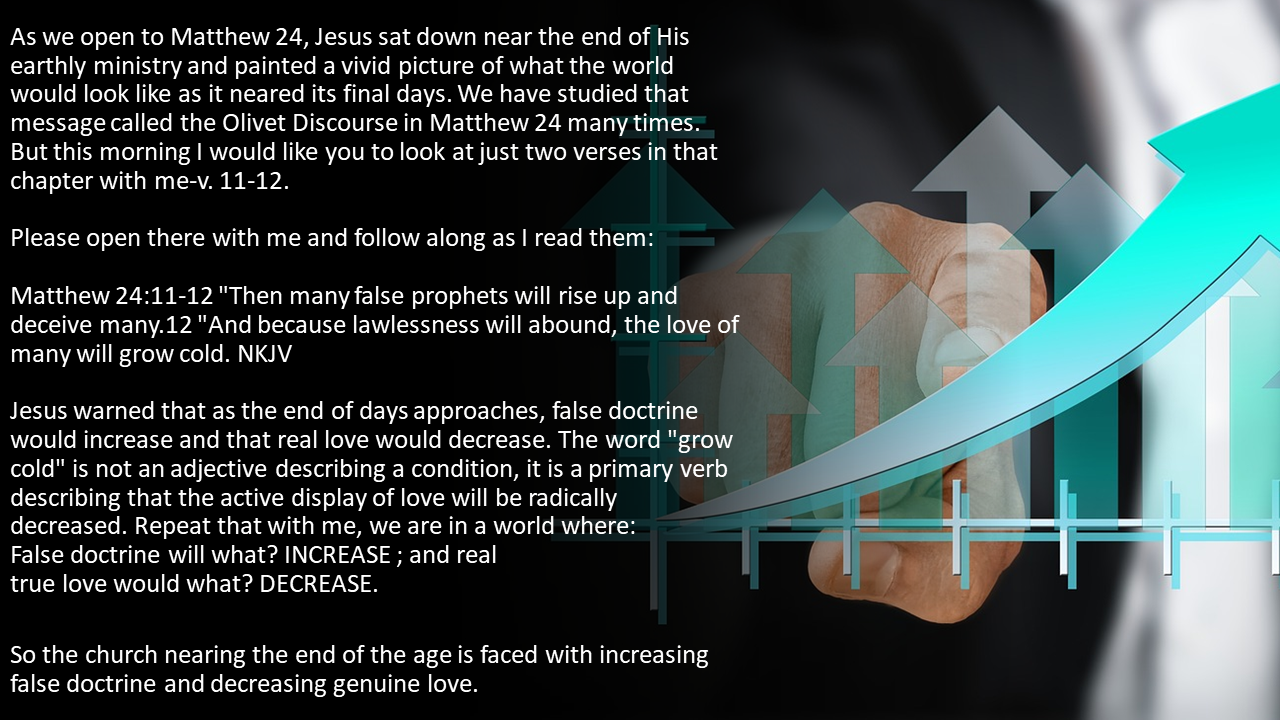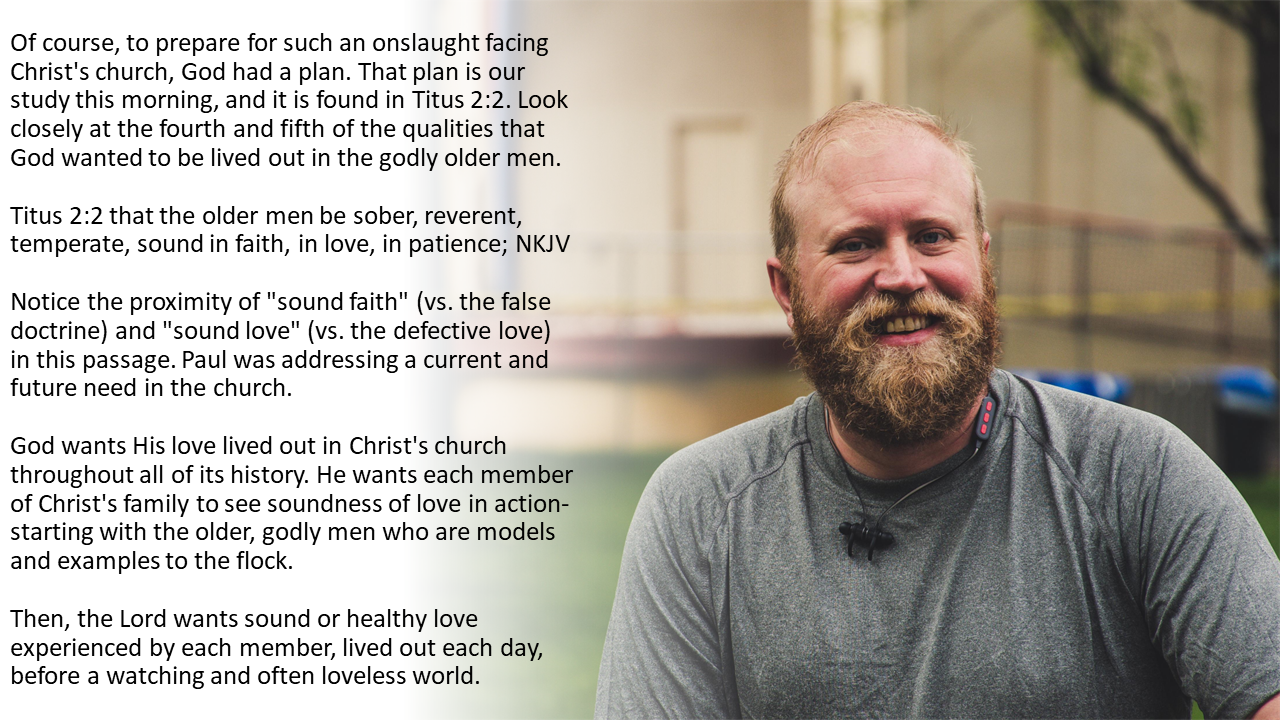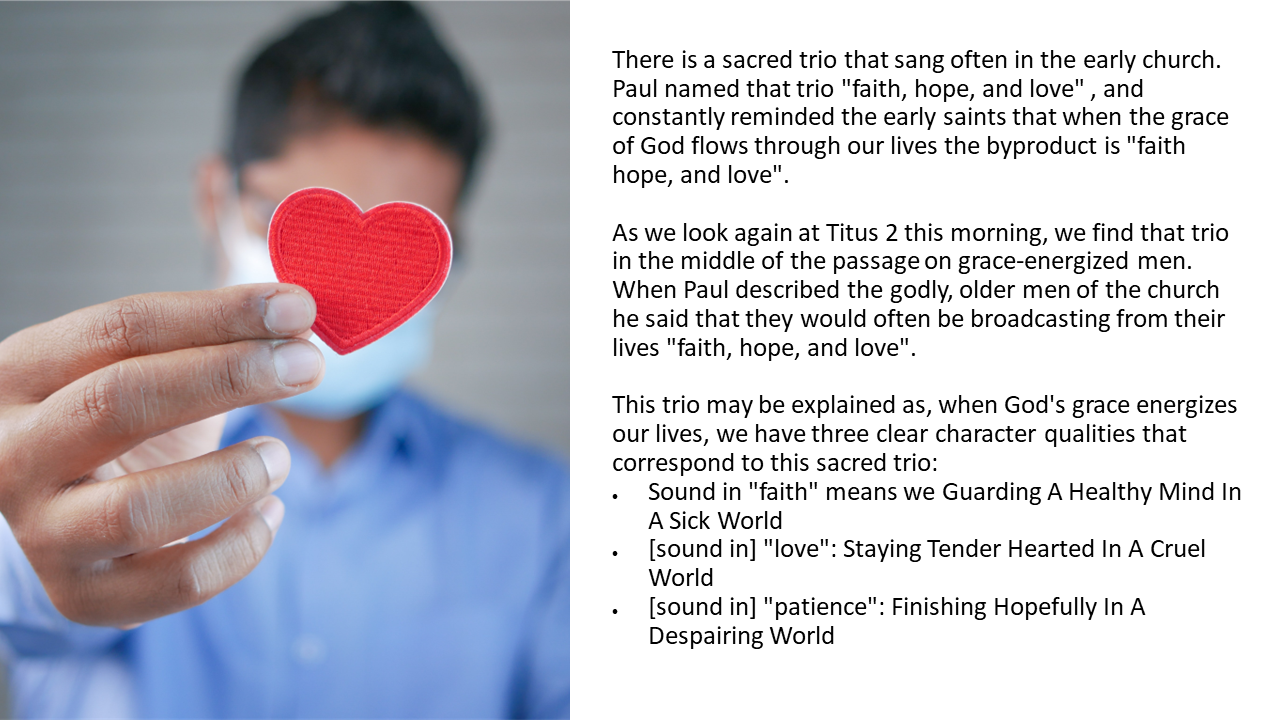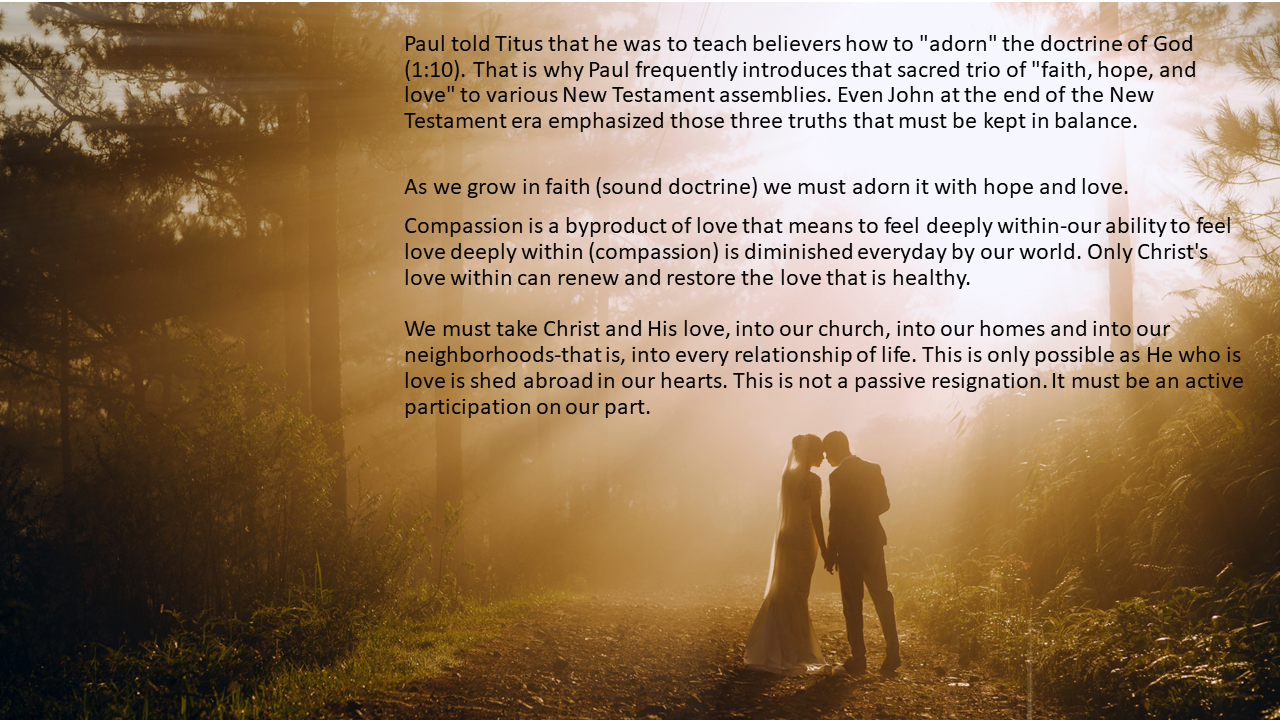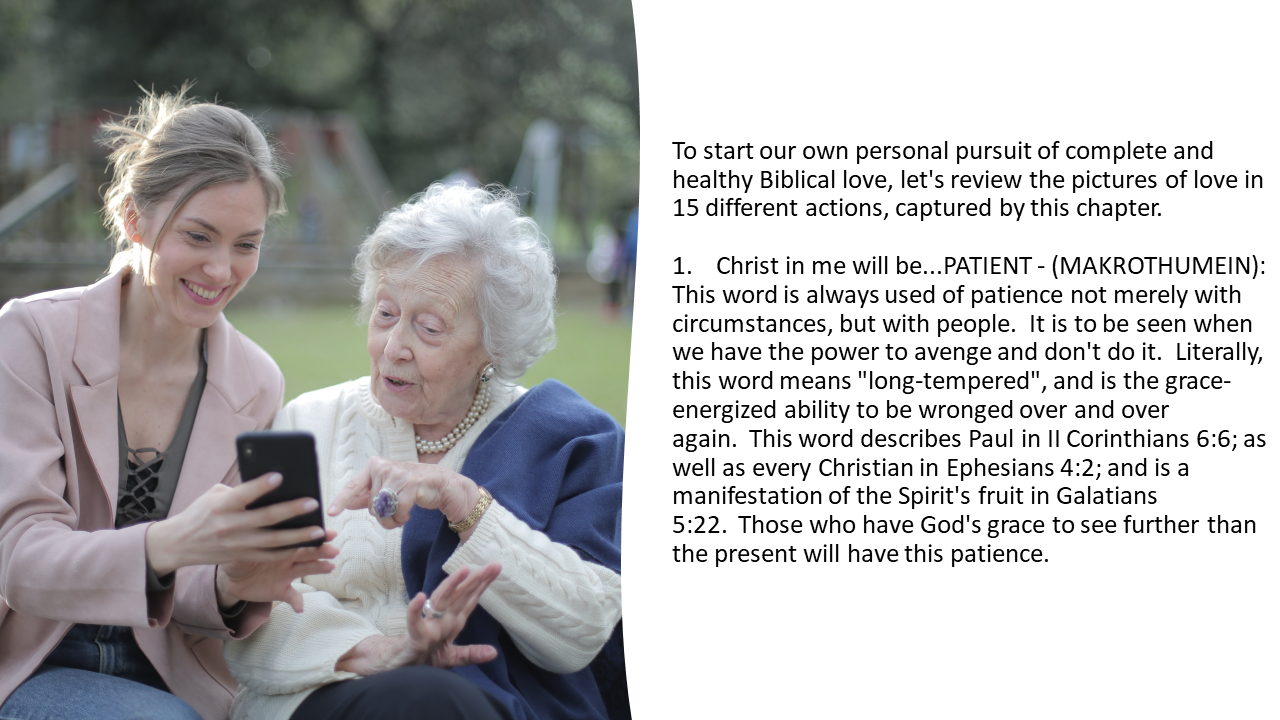GEM-23
080504AM
As we open to Matthew 24, Jesus sat down near the end of His earthly ministry and painted a vivid picture of what the world would look like as it neared its final days. We have studied that message called the Olivet Discourse in Matthew 24 many times. But this morning I would like you to look at just two verses in that chapter with me-v. 11-12.
Please open there with me and follow along as I read them:
Matthew 24:11-12 “Then many false prophets will rise up and deceive many.12 “And because lawlessness will abound, the love of many will grow cold. NKJV
Jesus warned that as the end of days approaches, false doctrine would increase and that real love would decrease. The word “grow cold” is not an adjective describing a condition, it is a primary verb describing that the active display of love will be radically decreased. Repeat that with me, we are in a world where:
- False doctrine will what? INCREASE (right); and where
- True love would what? DECREASE.
So the church nearing the end of the age is faced with increasing false doctrine and decreasing genuine love.
False Doctrines Rising and Genuine Love Waning
Of course, to prepare for such an onslaught facing Christ’s church, God had a plan. That plan is our study this morning, and it is found in Titus 2:2. Look closely at the fourth and fifth of the qualities that God wanted to be lived out in the godly older men.
Titus 2:2 that the older men be sober, reverent, temperate, sound in faith, in love, in patience; NKJV
Notice the proximity of “sound faith” (vs. the false doctrine) and “sound love” (vs. the defective love) in this passage. Paul was addressing a current and future need in the church.
God wants His love lived out in Christ’s church throughout all of its history. He wants each member of Christ’s family to see soundness of love in action-starting with the older, godly men who are models and examples to the flock.
Then, the Lord wants sound or healthy love experienced by each member, lived out each day, before a watching and often loveless world.
So, as we come to this fifth quality of a godly man, let me ask all of us gathered today–how sound is your love this morning? We have shared several weeks looking at sound faith and healthy doctrine. But this morning Paul moves us on in his letter to Titus to an even more important topic. In other words, how complete is your love this morning? How fully functioning is it? Do you have healthy love, the kind that God says characterizes us as believers.
The Sacred Trio
There is a sacred trio that sang often in the early church. Paul named that trio “faith, hope, and love” , and constantly reminded the early saints that when the grace of God flows through our lives the byproduct is “faith hope, and love”.
As we look again at Titus 2 this morning, we find that trio in the middle of the passage on grace-energized men. When Paul described the godly, older men of the church he said that they would often be broadcasting from their lives “faith, hope, and love”.
This trio may be explained as, when God’s grace energizes our lives, we have three clear character qualities that correspond to this sacred trio:
- Sound in “faith” means we Guarding A Healthy Mind In A Sick World
- [sound in] “love”: Staying Tender Hearted In A Cruel World
- [sound in] “patience”: Finishing Hopefully In A Despairing World
And, as we know so well from I Corinthians 13, any doctrine not wrapped in love is useless to God in His plan for Christ’s church. To best see love as it should be, the sound and healthy love that the Lord desires to flow out of our lives, turn with me to I Corinthians 13:4-8 and follow along as we read of love that is Divine.
Stand/Read/Pray
1 Corinthians 13:4-8a Love suffers long and is kind; love does not envy; love does not parade itself, is not puffed up; 5 does not behave rudely, does not seek its own, is not provoked, thinks no evil;6 does not rejoice in iniquity, but rejoices in the truth;7 bears all things, believes all things, hopes all things, endures all things.8 Love never fails. NKJV
Paul told Titus that he was to teach believers how to “adorn” the doctrine of God (1:10). That is why Paul frequently introduces that sacred trio of “faith, hope, and love” to various New Testament assemblies. Even John at the end of the New Testament era emphasized those three truths that must be kept in balance.
As we grow in faith (sound doctrine) we must adorn it with hope and love.
Grace-energized Men Are Sound in Love:
They Stay Tender Hearted In a Cruel World
Our Lord Jesus said in John 13:35 “By this all will know that you are My disciples, if you have love for one another” (NKJV). By what are we to be known? By love.
Compassion is a byproduct of love that means to feel deeply within-our ability to feel love deeply within (compassion) is diminished everyday by our world. Only Christ’s love within can renew and restore the love that is healthy.
We must take Christ and His love, into our church, into our homes and into our neighborhoods-that is, into every relationship of life. This is only possible as He who is love is shed abroad in our hearts. This is not a passive resignation. It must be an active participation on our part.
The apostle Paul wrote to a city church that mirrored the very culture we live in. Lets take a trip to Corinth Century one and stop in Tulsa 2008…
LOVE was LACKING IN CORINTH
Let’s journey back to the City of Corinth for a quick visit.
Sprawling along the thin isthmus joining the two halves of Ancient Greece was first Century Corinth. With the azure green waters and pure white sands of the Aegean Sea on both sides, it was a bustling commercial center in Greece, boasting world famous sporting centers and hosting the Pan-Ionian Games.
This city afforded too many temptations for the fun loving Corinthian Christians. The Apostle Paul had seen many wondrous conversions. He wrote to them, calling them saints, for so they were in Christ. But, lacking spiritual discipline they were slipping back into the evils they faced each day.
If we were to scan this epistle in a couple of minutes and grab the big problems they faced in Century One Christianity, these would be the “Sins of the Saints of Corinth.”
THE SINS OF THE SAINTS OF CORINTH
1. In First Corinthians 1:10 we see they were DIVISIVE: they were following men and their movements more than God and His truth.
2. In First Corinthians 1:18-20 we see they were ARROGANT: they were hung up on their great knowledge and philosophy rather than the simple gospel.
3. In First Corinthians 1:26 we see that they were WORLDLY: they were pursuing cultural, societal, and worldly prestige. The temporal was triumphing over the eternal.
4. In First Corinthians 3:1-3 we see they were FLESHLY: they had developed a carnality, which reduced the serious holiness of the Christian life to the mere sidelight of the Christian life.
5. In First Corinthians 5:1 we find they had sunken into utter MORALLY LAX: they had developed an ungodly toleration of sexual promiscuity, especially seen in the list of I Corinthians 6:9-11.
6. In First Corinthians 6:1 we find they were LITIGIOUS: they had caught a “vengeful, get even, get all I can, my rights first” attitude toward one another.
7. In First Corinthians 7 we find they were CONFUSED: they had a low view of marriage, thus there was confusion over God’s principles for a Biblical marriage.
8. In First Corinthians 8:1 they were SELFISH: their liberty in Christ was being misused by a selfish lack of love and care for others.
9. In First Corinthians 9:24 we see that they were UNDISCIPLINED: they desperately needed to learn that God commands strict self-denial unto holiness.
10. In First Corinthians 10:6 we find they were LUSTFUL: they were chasing after worldly things and worldly pleasures.
11. In First Corinthians 10:16-22 we find they were COMPROMISING: as John Bunyan said in his Pilgrims Progress, they were “Mr. Facing Both Ways” because they came to the Lord’s Table and also to pagan idol worship.
12. In First Corinthians 11:1 we see a UNSUBMISSIVE: they had allowed a perversion of godly gender specific male/female roles in church, home and society.
13. First Corinthians 12-14 SPIRITUALLY EMPTY: they had perverted the proper use of spiritual gifts.
14. First Corinthians 15:1, 12 DOCTRINALLY ERRANT: they had lost their grip on resurrection truth.
So love was lacking, and they were neither sound in faith nor in love. So Paul explains to this very needy church that what they need is-
Genuine Love: Looks like Christ
The picture of genuine love in 1st Corinthians 13 is not the thought of Paul, it is the work of a Divine photographer; and Christ is the subject of the picture. Jesus was and is incarnate Love. To love like God desires is to be like Christ; and the degree of our failure is the measure of our unlikeness to Him.
In His presence there is fullness of joy. It is only as we spend time in His presence that we can become more like Him. And truly as we make choices to obey His word, there is great joy which will be ours!. A Christian is described as one who sins less and less and obeys the WORD OF GOD more and more. Only as we abide in Him — meeting with Him in reading and meditating upon the WORD OF GOD as we hide His Word in our hearts — and being in continually in prayer (Prayer ought to be as natural as breathing) that we become more and more like Christ.
There is no instant way to become a mature Christian woman. We are conditioned by the “instant” nature of the world we live in — instant food, instant communications, instant updates on weather and news, etc. that we somehow believe that there ought be a way for “instant maturity in Christ”. There isn’t. We must be faithfully seeking to spend time with God every day when we desire to learn from Him as we sit at His feet.
To start our own personal pursuit of complete and healthy Biblical love, let’s review the pictures of love in 15 different actions, captured by this chapter.
1. Christ in me will be…PATIENT – (MAKROTHUMEIN): This word is always used of patience not merely with circumstances, but with people. It is to be seen when we have the power to avenge and don’t do it. Literally, this word means “long-tempered”, and is the grace-energized ability to be wronged over and over again. This word describes Paul in II Corinthians 6:6; as well as every Christian in Ephesians 4:2; and is a manifestation of the Spirit’s fruit in Galatians 5:22. Those who have God’s grace to see further than the present will have this patience.
2. Christ in me will be…KIND – (CHESTEUETAI): The other side of patience is here taking any grief, giving anything to be helpful and useful, healing wounds.
3. Christ in me will be…NOT JEALOUS – (ZELOI): Paul now starts with a listing of eight negative descriptions of love in action-what love is not doing. There will be 7 positive actions, and 8 negative actions that together give us a complete portrait of Christ’s love through us. Christ’s love is never envious. The root word here is “to boil, seethe”. This evil to be repented of is not the mere ‘I want what you have’; it’s the malignant ‘I don’t want you to have and keep what I can’t have’.
4. Christ in me will be…NOT BRAGGING – (PERPEREUETAI): Christ’s love is not boastful, the verbalizing of self, the root is the word for which we get windbag.
5. Christ in me will be…NOT ARROGANT – (PHUSIOUTAI): Christ’s love is conceited. The attitude of pride. I am better, etc. It is when one becomes inflated with their own importance.
6. Christ in me will be…NOT ACTING UNBECOMINGLY – (ASCHEMONEI): Christ’s love is not rude is better seen as “love does not behave gracelessly.” The Greek words for grace and charm are notably the same. As Swindoll put it, in Christ we become winsome.
7. Christ in me will be…NOT SEEKING IT’S OWN – ( ): Christ’s love is not insistent upon it’s rights, but seeks Christ’s attitude when He took upon Himself the form of a servant.
8. Christ in me will be…NOT PROVOKED – (PAROXUNETAI): Christ’s love is never flying into a rage. This is the lack of becoming exasperated. As Kipling said, “Master this and you have it all.” Better yet Solomon in Proverbs 25:28, “He that hath no rule over his own spirit is like a city without walls and broken down.” There are really only two kinds of people, those who think of their rights and those who think of others. Our mind set is either selfish or selfless…
9. Christ in me will be…NOT TAKING INTO ACCOUNT A WRONG SUFFERED – (LOGIZOMAI ): Christ’s love seeks to remember no evil. This is refusing to store up the memory of any wrong received. What a liberating truth to grasp hold of like an accountant, clear the ledger. As Chrysostom said, “Love is like a spark falling into the ocean is quenched.” As God does not hold our sins against us in Romans 4:8, Psalm 32.
10. Christ in me will be…NOT REJOICING IN UNRIGHTEOUSNESS – ( ): Christ’s love is taking no pleasure in evil reports as do the heathen in Romans 1:32. The meaning of iniquity is “unrighteousness”. Unrighteousness talks about sin. Love never rejoices in sin.
11. Christ in me will be…REJOICING WITH THE TRUTH – (SUGCHAIREI): Christ’s love is in harmony with the truth, and partaking in the love of the truth. 2 Thessalonians 2:10 which is the joy of God. As Psalm 15 says that those who are godly, “speak truth in heart.” Holiness or righteousness is based on truth. In John 14:6 Jesus said, “I am the way, the truth and the life”. One cannot be righteous until he behaves himself in accord with God’s truth.
12. Christ in me will be…BEARING ALL THINGS – (STEGAI) Literally, this word means “to cover on all sides, to cover in silence”. When Paul says, “love beareth all things” he is not talking about enduring a trial, he is talking about covering the ugliness in someone else’s life. Love out of respect and honest concern for the real value of another person will do everything it can to cover up the sin of that person. The great 19th century Bible teacher Scroggie once said: “Love is strong in its silences. It patiently endures what it has to suffer. It is not shaken by any sort of ingratitude. The word used here is highly pictorial. It is employed of holding fast, like a watertight vessel (I Peter 4:8); it is used of a roof which does not leak; it is used of troops defending a fortress, and it is used of ice bearing weight, and not giving way. It bravely stands up to life.”
13. Christ in me will be…BELIEVING ALL THINGS – (PISTEUEI): as His grace enables me to not be suspicious, but trusting God’s plan. This action of love makes me completely trusting God, and believing the best about others. Love sees the weakness, throws a mantle of silence over it, and then believes the best. If you are going to make a mistake about someone’s character, err on the side of love. Make a mistake in trusting or believing them too much. The Corinthians were evidently believing the worst; and they were suspecting and assumed that nobody ever told the truth. In Matthew 9 (v. 2b, 7, 3) we see the Pharisees felt this way about Jesus. They had a predisposition that Christ was evil; so whatever Jesus did had to be evil. They were cynical and suspicious. Once you start hating someone, you will try to find faults. On the contrary, once you start loving somebody, you will start covering their faults.
14. Christ in me will be…HOPING ALL THINGS – (ELPIZEI): Even amid repeated disappointments there is a constant assurance that God has a future and is working all things for His own glory. Love refuses to take failure as final. Jesus wouldn’t accept failure from Peter; and Paul wouldn’t accept failure from the Corinthians. Many a grace-energized, loving wife has held on to a struggling and failing husband; and many a grace-energized, loving parent has held on to a wayward child; and many a loving friend has held on to a fallen brother-by just holding on to this Spirit-prompted hope. Hope does not try to persuade itself that the thief is honest; but it holds tight knowing that man was MADE for honesty, for purity and the heavenly vision.
15. Christ in me will be…ENDURING ALL THINGS – (HUPOMENAI): The Greek term translated “endureth” is a military term which has to do with being positioned in the middle of a violent battle. The emphasis is not on handling little, minor annoyances. It refers to love that stands wounded and bleeding against incredible opposition and still loves. So we are called to actively choose to bear everything with triumphant endurance. Love never fails. Love never dies; it doesn’t end. Love cannot be conquered. This is the kind of love that took Jesus to Calvary, as it says in 1 John 3:16 By this we know love, because He laid down His life for us. And we also ought to lay down [our] lives for the brethren. (NKJV)
Where do I Start?
So how do we take all this truth, all these facts and do something tangible in our lives starting today?
In that Christian classic, “The Discipline of Grace”, Navigator theologian Jerry Bridges encourages us to put I Corinthians into personal actions statements. Let me share my personal action statements:
- I will not rejoice in sin because I love you and I know our holy God is offended by sin and sin will hurt you personally.
- I will take pleasure in the truth because I love you and want your life to reflect God’s holiness.
- I will bear all things because I love you and don’t want to parade your sin before other people.
- I will believe all things because I love you and will believe the best about you, not judging you wrongly. I will have faith in you.
- I will hope all things because I love you and know that god is seeking you and you are made for god; I will not despair of you because I know your needs and I know God’s grace.
- I will endure all things because I love you and the love of Christ is eternal; Jesus endured all opposition and persecution and prayed on the cross or his enemies. Love never dies.
Love needs to be Seen in Action
This entire section describing love describes it in action, it is a choice to do somethinmg. Not just an attitude but an action is what God desires from us.
1. Abound in love Philippians 1:9 And this I pray, that your love may abound still more and more in knowledge and all discernment, (NKJV)
2. Be fervent in love 1 Peter 4:8 And above all things have fervent love for one another, for “love will cover a multitude of sins.” (NKJV)
3. Be consistent in love (Phil. 2:2) Philippians 2:2 fulfill my joy by being like-minded, having the same love, [being] of one accord, of one mind. (NKJV)
4. Be sincere in love 2 Corinthians 8:8 I speak not by commandment, but I am testing the sincerity of your love by the diligence of others. (NKJV)
5. Continue in love Hebrews 13:1 Let brotherly love continue. (NKJV)
6. Follow after love 1 Corinthians 14:1 Pursue love, and desire spiritual [gifts,] but especially that you may prophesy. (NKJV)
7. Increase in love 1 Thessalonians 3:12 And may the Lord make you increase and abound in love to one another and to all, just as we [do] to you, (NKJV)
8. Put on love Colossians 3:14 But above all these things put on love, which is the bond of perfection. (NKJV)
9. Provoke each other to love Hebrews 10:29 Of how much worse punishment, do you suppose, will he be thought worthy who has trampled the Son of God underfoot, counted the blood of the covenant by which he was sanctified a common thing, and insulted the Spirit of grace? (NKJV)
Paul said follow me as I am following Christ:
- 1 Corinthians 4:16 Wherefore I beseech you, be ye followers of me. (KJV)
- 1 Corinthians 11:1 Be ye followers of me, even as I also [am] of Christ. (KJV)
Literally this means PATTERN your life after mine as I PATTERN my life after Christ. Cut around me exactly as I am because I am patterning my life after Christ…
We Must Make Choices to Act in Love
John 15:12-16– WE HAVE THE ABILITY FOR SELF-SACRIFICING LOVE THROUGH CHRIST (TAPE)
1. Acknowledge it is a command (Romans 13:8-10)
2. Agree you have the power (Romans 5:5)
3. Understand it is normal Christian behavior (I John 4:7-10)
4. Realize it is the Spirit’s work (Gal. 5:22)
5. Practice it. (I Peter 1:22, 4:8) (Hebrews. 5:8)
REDPATH: The picture of love is a photograph of the Lord Jesus Christ in His inner Character. In His church, He wants to have many reprints. We are looking at the Original, Himself. He is looking for the perfect reproduction of His life of love in us. To love like this is to be like the Lord. Christians are those born again by the Holy Spirit, in whom the Savior has become incarnate again, for we are partakers of a new nature — His Character, which is love.
Conclusion: We must take Christ and His love, into our homes, into the Marketplace, into our family life. In essence, this love must flow into every relationship of life. This is only possible as He who is love is shed abroad in our hearts. This is not a passive resignation. It must be an active participation on our part.
Our Lord Jesus said in John. 13:35, “By this all will all know that you are My disciples, if you have love for one another.” We must take Christ and His love into our churches, into our homes and into our neighborhoods. Into every relationship of life is only possible because His love is already flowing out of us by the Spirit who lives within..
REDPATH: This has been a photograph of Jesus Christ and perhaps you have felt Him looking into your own heart and asking about the reproduction of His love in your life. If you would learn to live like this, first you must receive that love into your heart. You must come to Jesus, take Him as your Lord and yield to Him.
Does this photograph find you out? Does it show your life to be the reverse of everything that Jesus is? If so, I can tell you that grace can triumphantly make you just like this, as you yield yourself to Him.
“Love Divine, all loves excelling,
Joy of heaven, to earth come down,
Fix in us Thy humble dwelling,
All Thy faithful mercies crown.
“Jesus, Thou art all compassion,
Pure unbounded love Thou art;
Visit us with Thy salvation,
Enter every trembling heart.
“Finish then Thy new creation;
Pure and spotless let it be;
Let us see Thy great salvation,
Perfectly restored in Thee.
“Changed from glory into glory,
Till in heaven we take our place,
Till we cast our crowns before Thee,
Lost in wonder, love, and praise!”
Charles Wesley (1747)


